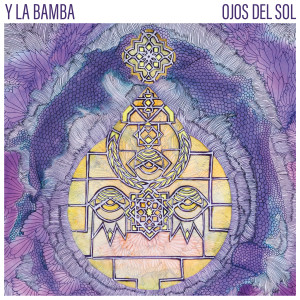 Lyrically, musically and thematically complex, Ojos del Sol represents a leap of creative faith by Luz Elena Mendoza, the Portland, Oregon-based singer-songwriter who leads Y La Bamba. Her previous efforts, including 2012’s Court the Storm have combined the rhythms, sounds and feelings of her ancestral homeland of Mexico with the folk and rock streams flowing in the musical hotbed of Portland. But Ojos del Sol pushes that synergy into a whole new realm.
Lyrically, musically and thematically complex, Ojos del Sol represents a leap of creative faith by Luz Elena Mendoza, the Portland, Oregon-based singer-songwriter who leads Y La Bamba. Her previous efforts, including 2012’s Court the Storm have combined the rhythms, sounds and feelings of her ancestral homeland of Mexico with the folk and rock streams flowing in the musical hotbed of Portland. But Ojos del Sol pushes that synergy into a whole new realm.
“A celebration of family and community” is the way Mendoza describes this album. On several songs she references her family, alluding to their lives as immigrants from Mexico. Born in San Francisco, Mendoza grew up in a Catholic family in southern Oregon, spending summers with cousins in California’s rich San Joaquin valley. Much of her life as a songwriter and singer has centered on her attempts to reconcile her heritage with both her artistic life in progressive, hip Portland and her spiritual quest that has taken her in other directions, including exploration of Eastern religions.
“I may have lost all of my reason so I could love the way I can,” she sings in “Ostrich,” one of a couple of songs here named for wildlife (the other being “Orca”). It’s also one of the most straightforward examples of singer-songwriter folk. This one especially reminds me of Angel Olson, although it is, like all of Mendoza’s songs, devoid of irony and posing of any kind. Its lyrics typify the album’s themes of land, spirit and love in all its shapres. “I’m a daughter of the southern mountain /some say that I come from a fruitful land / of milk and honey and holy tradition … In the wilderness is where we meet god hanging in the air / it’s my oxygen …” she sings in her signature style, her strong alto leaping at will into the soprano range.
The lyrics are poetic, impressionistic, complex, often open to interpretation. Spiritual questing and an oblique reference to the Bible’s Jonah story in “Orca” come up against references to her family: “What saves you might not save my soul / but that doesn’t mean I will not find my rest / Don’t sum me up and swallow me whole / Too soon to spit me right out of your breath. / My mother knows love and my mother knows pain.”
The tender and erotic love song that is the title track is entirely in Spanish. One other mixes English and Spanish. That one is “Libré,” or Freedom, and it’s one of two sung by a quintet of women’s voices called the Maria Maria Choir. The five are all musicians and songwriters based in Portland. These two songs stand out for the women’s vocal gymnastics and the arrangements by Portland-based composer Richie Greene. “Libré” features Afro-Cuban rhythms and chiming electric guitars, its shifting English and Spanish lyrics reflecting the subject matter. It’s a deeply spiritual song about connections among humans, the animal soul and the material world, referencing the indigenous Mexican myth of shape-shifters called naguales.
The other song featuring the Maria Maria choir, “Nos Veremos” or “See you later,” though entirely in English also has a Latin flavor to it. Its arrangement has only voices, percussion and handclaps plus a droning bass, but these elements are combined in a way that mirror the complex lyrics, which brush on spirituality, light, war and peace, and the natural world’s intersection with the soul. “We are people we are falling / out of nowhere can’t deny it / and the stars rise and shine / out of the same stone and fire,” says the deviously catchy repeated chorus.
“Kali,” perhaps the most directly spiritual, has a stripped-down arrangement of just Mendoza’s guitars plus bass and drums. It hints at an Indian-style pentatonic scale on the chiming clean electric guitar line, and lyrically it reminds me of Richard Thompson’s ode to his muse, “Calvary Cross.” It’s not as dark as that song but thematically it’s similar, with the voice of I assume Kali, the goddess of creation and destruction, repeating “Whatever it is you want / I am not here to give it to you.”
Ojos del Sol is an arresting album. The atmospheric sound and layered vocals immediately let you know that this is something a little different. Mendoza’s insistent delivery of her lyrics, which are at once personal and broadly universal, pulls you into her world where songs and mysterious spiritual connections have the power to heal. The message of uplift doesn’t sugarcoat the suffering it can take to reach that healing place, but it never turns away from either pain or joy. Ojos del Sol may just be a classic of Mexican-American rock in the company of Los Lobos’ Kiko, Lila Downs’ La Cantina and Lhasa’s The Living Road. It’s that impressive.
(Tender Loving Empire, 2016)
There’s a video of a live performance of “Atmosphere” on the OPB website.
Y La Bamba has a website where you can listen to the album, and they’re on Facebook.
